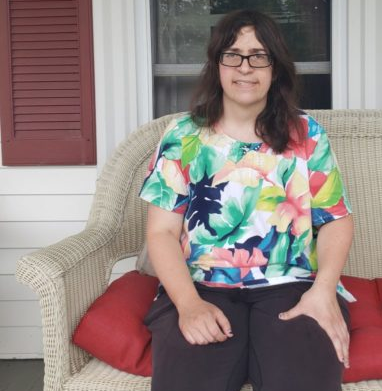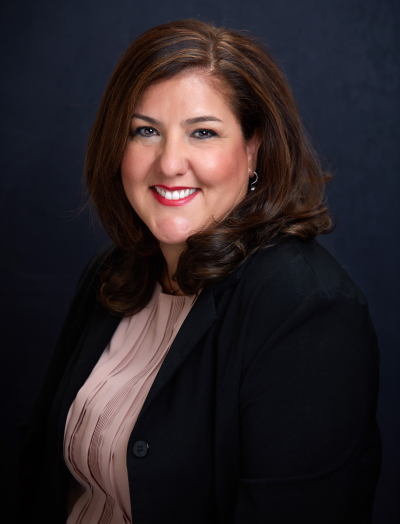Growing up autistic, Meghan McCarthy found it hard to make friends. By age 24, still living with parents whom she dearly loved, she was craving independence and a community of her own.
What satisfies that desire is the Boston-area home where, since 2014, McCarthy has lived with five other people.
“There are so many people who just love me and want to support me in any decision I make and just, basically, be there for me. Which was something I didn’t really have growing up,” said McCarthy, now 31, likening her roommates to a family.

Courtesy Andy Marso
Meghan McCarthy sits on the porch of her Boston area home that she shares with roommates.
The home is owned and overseen by L’Arche, an international organization formed in 1964 as one of the first of its kind to pair people with and without disabilities as roommates. Operating in 19 U.S. cities and 150 cities worldwide, L’Arche was on the leading edge of a housing innovation that, in recent years, has spawned online and other roommate-matching for people with disabilities who want more options than living with relatives, in group homes or institutions.
Only 17% of adults with disabilities in the U.S. live independently, according to Easterseals, which is dedicated to integrating people with disabilities into their communities. About 70% live with their parents or other relatives and 10% live in group homes or other institutions. The remaining 3% are in other living arrangements, including roommate-sharing agreements.
Lupe Trevizo-Reinoso, vice president of living options for Easterseals Southern California, said her organization arranges a variety of housing for people with disabilities, including getting them their own apartment, placing them in four-person group homes or matching them with roommates. Roommates are a great alternative for people who may need more support than just a daily drop-in visit but don’t need the intensive support of a group home staffed by medical professionals, she said.
 “It’s an excellent option to offset not only the cost of living, but also the cost of support staff,” Trevizo-Reinoso said. “So you may share an overnight staff [member], but they’re there to support both folks.”
“It’s an excellent option to offset not only the cost of living, but also the cost of support staff,” Trevizo-Reinoso said. “So you may share an overnight staff [member], but they’re there to support both folks.”
The roommate option is growing. Based in the Seattle area, Partners4Housing has been matching roommates with disabilities throughout Washington for several years. It also has operations in Arizona and recently launched in New York.
“That’s always successful when somebody can move out of their family home into a place of their choosing with people they choose to live with, with the support they need,” said Pam Blanton, Partners4Housing’s founder. “I mean, it’s a much better option than a vacant bedroom in a group home, right?”
Private roommate organizations filled in a housing gap
Blanton spent years working as housing coordinator for King County, Wash., trying to find affordable housing for residents with developmental disabilities. In 2010, she ventured on her own to do what, to her, government agencies in her area seemed willing to spearhead.
“From the moment I took that position as [county] housing coordinator people were asking for roommate matching,” Blanton said. “It just made sense. Families said, ‘if we can help our loved one find a compatible roommate, we can figure out this housing thing.’”
Blanton envisioned Partners4Housing as a “Match.com-style program,” she said, referring to the popular dating website, for roommates with disabilities. She borrowed from what Match touts as its extensive profile-building questionnaire, creating a 126-question residential assessment of what her potential clients desired in a roommate. It includes information that helps her team determine what taxpayer-funded and other services the applicant is eligible for as well. Partners4Housing, then, matches people with disabilities as roommates and by sharing the costs of housing and disability support services, they’re able to live independently.
It charges $500 for the assessment, which includes a one-year subscription to the online roommate-matching pool. Additional years cost $120 each.
In Washington, Blanton said, Partners4Housing has helped set up 41 homes serving 95 people with disabilities and has 125 Washingtonians on a waiting list for roommates. Her organization is seeking local partners in every state who know the regulations and services available in their areas for people with disabilities.

Lupe Trevizo-Reinoso, vice president of living options for Easterseals Southern California.
Minnesota-based roommate-matcher Rumi also plans to expand beyond state lines. But its spokesman, Bach Parker, wrote via email that it would not elaborate on those plans, concerned that it cannot precisely answer what its services will look like in different locales.
In southern California, said Trevizo-Reinoso of Easterseals, demand for roommate arrangements is high. But prohibitive, and still soaring, housing costs make it even harder to find a place for people with disabilities and roommates with whom they’ve already been matched. The average monthly Supplemental Security Income benefit for the disabled is $1,200, she said.
“Even if you have two people and $2,400, an apartment can cost you as much as $1,800 to $2,000,” she said. “So, most of their money goes into housing and housing is limited for people with limited credit. Sometimes it can take us three to six months to help somebody find an apartment.”
Having a roommate can be “life-changing”
McCarthy said the roommate model has been life-changing for her.
As a kid, envied how easily her brothers made friends. She wondered if she would ever enjoy those kinds of relationships.
“I just didn’t really have very many friends and I just felt really isolated,” she said. “I didn’t really feel, like, besides my parents, anybody else could really support me and help me through the challenges of life.”
Three people with disabilities are what L’Arche calls core members of her house, which also includes one person without disabilities who is called an assistant.
McCarthy can quickly list off which of her roommates love to dance, which is big into Bruce Springsteen and which one “gives, literally, the biggest hugs.”
“Meghan’s probably the most popular gal in all of our community,” said Vanessa Henry, director of community life for L’Arche North Boston. “Every core member and assistant is trying to get a little time with Meghan.”
Henry said L’Arche residents have a wide range of disabilities. While the assistants help with their care, the intention is to avoid a hierarchy of staffed caregivers and disabled recipients of that care. Instead, the aim is to, “live in fellowship” as friends who help each other, according to their needs. =
McCarthy said she was fortunate to find L’Arche.
“My service coordinator reached out to my mom and told me all about it, how wonderful it was and how I could make so many friends,” McCarthy recalled. “She just said ‘I’d really love for you guys to go check them out. It’s a really cool place.’ I would say, for the most part, it’s been awesome ever since.”






























